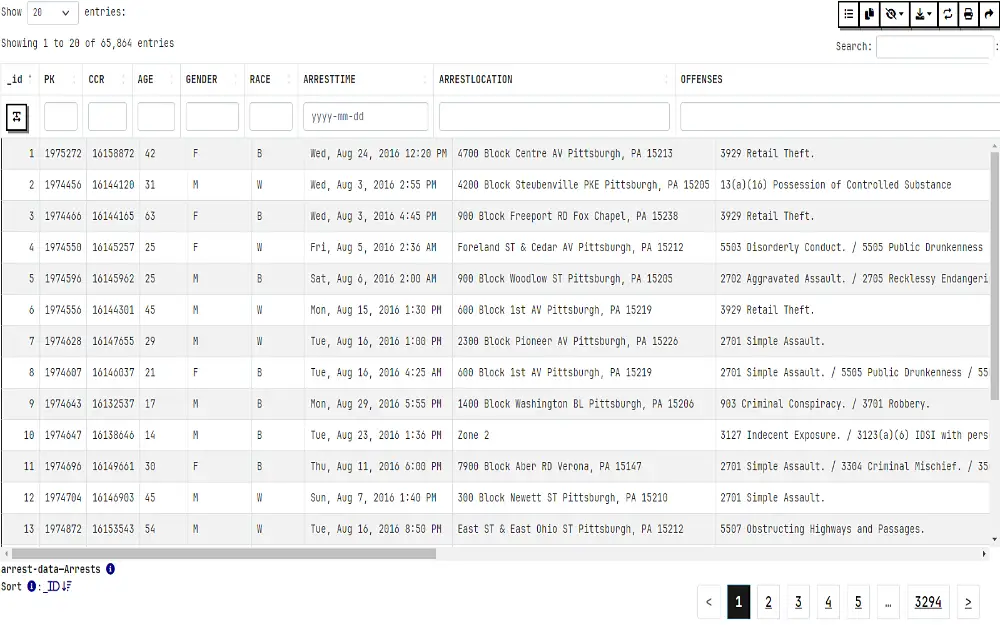Run a free Allegheny County warrant search to find out if you or someone else is wanted.
Warrant records are part of public documents and can be accessed by citizens due to the federal Freedom of Information Act (FOIA) and Pennsylvania’s Right to Know Law.
Interested parties can look for warrant records at no cost via county and state agencies in electronic form and as document requests. This resource provides aggregate links from official channels to help citizens acquire any wanted persons’ records in Allegheny County, Pennsylvania.
Tracking Down Free Warrant Information in Allegheny County Pennsylvania (An Overview)
To find information on warrants, citizens must have adequate information on the subject to successfully execute the search, including the full names of the wanted individuals.
In addition, it would be helpful to know the county that issued the arrest or the residence of the wanted person. Though not necessary, having additional information such as the wanted person’s date of birth (DOB), physical description, or case number (if known) may make it easier to track down persons with warrants.
Judges order warrants, and as such, are a type of court record; as a result, they can be consumed by the public due to Pennsylvania’s Right To Know Law.1 This statute makes it such that any citizen in Allegany County can request to request warrant data without providing a reason. Several types of warrants will be expanded upon in subsequent sections, including arrest, search, probation, and parole.
There are several places to find information on wanted persons, including county and state agencies; in some cases, patrons may turn to local city public channels to find offenders with warrants. In Allegheny County, the primary county custodians of warrant data are the Court of Common Pleas and the Sheriff’s Office. For most part, warrant records can be sought at no cost except when a nominal fee applies for document reproduction.
How To Run an Allegheny County Warrant Search
Citizens who need to find out whether they or someone else has an active warrant can turn to county agencies, mainly the Court of Common Pleas and the Allegheny County Sheriff’s Office. There are several options to retrieve warrant records; they can be sought electronically, by calling the custodian of records and by visiting the public agencies.
Acquire Warrant Records from the Court of Common Pleas: The Allegheny County Court of Common Pleas generates warrants in the county and is a viable point of contact for citizens who need information on wanted persons.
The easiest and most convenient way to view these records would be to use the Allegheny County Court Case Search Tool, which scours court documents online for free.2 The instrument provides users with several criteria to find court records, including participant name (party of the case), date filed, and docket number.

If searching by subject’s name, which would be the simplified criteria, users can select the docket type (criminal, civil, traffic, traffic, etc) depending on the type of warrant, case status, and date of birth (DOB). Information displayed on warrants includes the date of issue, reason, and name of the offender.
In addition, requestors can visit the court at the address below or call 412.350.5378.
Allegheny County Clerk of Courts
436 Grant Street Courthouse 220
Pittsburgh, Pennsylvania 15219
Moreover, the court provides citizens a way to search for statewide warrants; these will be delved into in the following sections.
Search for Warrant Data from the Sheriff’s Office: The Allegheny County Sheriff’s Office Warrant Office is the main custodian of bench warrants issued by the Common Pleas Courts – Criminal Division. Suppose someone thinks they may have a warrant. In that case, they will need to visit the Allegheny County Sheriff’s Office in person since it will not provide information pertaining to wanted offenders over the phone.
Please note that if the requestor has an active and outstanding warrant, the sheriff may take them into custody.
Allegheny County Sheriff’s Office
436 Grant Street Courthouse 111
Pittsburgh, Pennsylvania 15219
In addition, citizens can submit an anonymous tip on offenders with active warrants. Patrons will need to supply information on the wanted person, such as name, nickname, DOB and physical address.
For more information on warrants, see these frequently asked questions, call the Allegheny County Sheriff’s Office at 412.350.4700 or email [email protected].3
Furthermore, other than criminal warrants, the Sheriff’s Office of Allegheny County provides a list of offenders wanted for other types of arrest orders. These include offenders with family division bench warrants; these are issued to individuals who have failed to abide by court proceedings of the family court, as in the case of making child support payments.
Call 412.350.3204 or use the prior link to submit a tip; alternatively citizens may view answers to common queries about warrants.4
More serious offenders, such as those who are wanted for firearms-related crimes, are on this list. In addition, a list of offenders wanted for violent crimes is also furnished by the Sheriff’s Office.5 Call 412.350.4714 or submit a tip on an offender using the link provided above.

Information on all these lists shows the following information:
- Mugshots (Photographs)
- Name of Offender
- City of Crime
- Date of Birth (DOB)
- Sex
- Race
- Height
- Weight
- Hair & Eye Color
Find Warrant Information Through Cities in the County: Some of the most populated cities in Allegheny County are Pittsburgh, Bethel Park and Monroeville. The City of Pittsburgh Police Department provides lists of offenders wanted for several reasons; these include individuals who have failed to appear for trial and parole violators.6

Contact the Pittsburgh Police at the 311 Response Center (412.255.2621 if outside the city) for more information. Citizens may also use the service request form online to obtain additional information.8 The address for the law enforcement agency is below.
City of Pittsburgh Police Department
City-County Building
414 Grant Street
Pittsburgh, Pennsylvania 15219
How To Check for Warrants Issued Anywhere in PA
Interested parties who need to find offenders in counties other than Allegheny can look up anyone wanted throughout Pennsylvania.
A reliable way of doing so is via Pennsylvania’s Unified Judicial System – Secure eServices.9 One of the services from this suite of tools is a Statewide Warrants Option Search Tool. To use this feature, users must register by inputting their data such as names, addresses and phone numbers.
Registration and use of the portal are, however, free. The portal accepts the offender’s information, such as their full name and date of birth (DOB), and returns information such as the reason for the warrant, date of issue and county.
Records from this database are sought from the Magisterial District Judge and the Allegheny County Common Pleas Criminal databases for case management. The system has data on active warrants regardless of the date of issue; information on warrants no longer active remain in the database for a year.
Moreover, the Pennsylvania Parole Board has a list of absconders wanted by the state agency.10 The list is free to access and allows users to search by name, county and sex.

Data on offenders include their names (and alias names), mugshots, and release data. Citizens may report the absconder through a link on their profile, calling +1.800.9320.4857 or emailing [email protected].
Various Kinds of Warrants & Their Implications
Several types of warrants issued by the courts, including arrest, bench, search, and fugitive warrants. A warrant is a writ (written order) issued by a judge that authorizes law enforcement personnel to take an action such as arresting individuals or searching a premises.
While violating citizens’ privacy, these orders are accommodated by the Fourth Amendment of the U.S. Constitution.
The most common warrants in Pennsylvania and Allegheny County are arrest and search writs. Arrest warrants are documents signed and issued by a judge or magistrate with the support of a signed affidavit demonstrating probable cause and giving authority to law enforcement agencies to take an individual into custody.
Search warrants are a written order by a judge allowing law enforcement personnel to conduct searches on a person, place or thing such as a motor vehicle.11
Bench warrants are orders issued to offenders who have failed to appear for their scheduled court hearings, whether it was a citation or summons or not appearing for the execution of a sentence. Convicted offenders under supervision who have subsequently violated their conditions receive Probation or Parole Violation warrants. The Pennsylvania Parole Board, as seen earlier, furnishes a statewide list of absconders.
Persons who fail their obligation in making child maintenance payments may receive child support warrants—in Allegheny County, these individuals can be found through a non-support fugitive list provided by the Sheriff’s Office.12 Traffic warrants are issued when citizens have unpaid traffic citations.
Civil Capias warrants are an apprehension writ due to the defendant’s repetitive failure to comply with court orders. Capias warrants, conversely, are issued when defendants have been convicted of an offense or made a plea and then failed to pay a fine or meet a condition set by the court.
Fugitive warrants are sent out of state when an offender is in a local jurisdiction. Lastly, Governor’s warrants are issued from the Governor’s Office, allowing offenders suspected of a crime to be routed to the state where they committed the illegal act.
How To Resolve Active Warrants in Allegheny County
Upon finding and confirming an active warrant, it is important to resolve it to avoid unnecessary jail time; this can be accomplished through several means, such as settling court fines or scheduling a new court date. Upon confirming a warrant on someone else, it is advisable to notify them as soon as possible.
If the wanted person lives in the community and perhaps may be a violent offender, it is important to inform law enforcement agencies. The Allegheny County Sheriff’s Office makes it convenient to notify the agency of offenders with warrants online or by calling 412.350.4700, 412.350.3204, 412.350.4714, or emailing [email protected].13
When a citizen has found out they have a warrant, they should take several steps to help resolve the active warrant. It is advisable to seek legal counsel to help quash a warrant, particularly one that has been outstanding for a while.
If a warrant has been issued due to a fine, then paying this fine will resolve the warrant. Citizens can clear bench warrants by rescheduling a new court appearance and apologizing to the court for the missed date. Child support warrants are cleared by paying the amount in arrears, while probation and parole writs are cured by reporting to the supervising officer; however, this may lead to arrest and re-incarceration.
As seen earlier, citizens cannot confirm a warrant from the Allegheny County Sheriff’s Office except by visiting the agency. Turning oneself in is one way of resolving a warrant; therefore, before approaching this agency, it is best to notify a family member, legal representative (aid), and a bail bondsman to arrange a bond should the individual be taken into custody.
The capacity to run an Allegheny County warrant search allows citizens to ascertain whether they or someone else are wanted, and this article provides helpful resources to help patrons acquire this information and resolve any outstanding writs; extend your lookup to cover other record types (arrests, probation, parole, court, and more) using the Allegheny County public information search instructions.
References
1Pennsylvania General Assembly. (2008, February 14). 2008 Act 3 Right-to-know Law – Enactment. Retrieved January 12, 2024, from <https://www.legis.state.pa.us/CFDOCS/LEGIS/LI/uconsCheck.cfm?txtType=HTM&yr=2008&sessInd=0&smthLwInd=0&act=0003.&CFID=319278311&CFTOKEN=24899523>
2Unified Judicial System Pennsylvania. (n.d). Case Search. Retrieved January 12, 2024, from <https://ujsportal.pacourts.us/CaseSearch>
3Allegheny County Sheriff’s Office. (n.d). Contact Information. Retrieved January 12, 2024, from <https://sheriffalleghenycounty.com/contact/>
4Allegheny County Sheriff’s Office. (n.d). Non-Support Warrants FAQ. Retrieved January 12, 2024, from <https://sheriffalleghenycounty.com/non-support-warrants-faq/>
5Allegheny County Sheriff’s Office. (n.d). Fugitive Type: Most Wanted. Retrieved January 12, 2024, from <https://sheriffalleghenycounty.com/fugitive-type/most-wanted/>
6Western Pennsylvania Regional Data Center. (2023, November 14). Pittsburgh Police Arrest Data. Retrieved January 12, 2024, from <https://data.wprdc.org/dataset/arrest-data>
7Western Pennsylvania Regional Data Center. (2023, November 14). Arrests. Retrieved January 12, 2024, from <https://data.wprdc.org/dataset/arrest-data/resource/e03a89dd-134a-4ee8-a2bd-62c40aeebc6f>
8Pittsburgh City Police Department. (n.d). 311 Request Form. Retrieved January 12, 2024, from <https://pittsburghpa.gov/311/form>
9Unified Judicial System Pennsylvania. (n.d). Secure eServices. Retrieved January 12, 2024, from <https://ujsportal.pacourts.us/secureservices.aspx>
10Pennsylvania Parole Board. (n.d). Most Wanted Absconders. Retrieved January 12, 2024, from <https://www.pa.gov/pbpp/absconders>
11Pennsylvania State Inspector General Office. (2021, October 18). Search Warrants Policy. Retrieved January 12, 2024, from <https://www.osig.pa.gov/About-OSIG/policies/Documents/Search%20Warrants%20Policy.pdf>
12Allegheny County Sheriff’s Office. (n.d). Fugitive Type: Non-Support. Retrieved January 12, 2024, from <https://sheriffalleghenycounty.com/fugitive-type/non-support/>
13Allegheny County Sheriff’s Office. (n.d). Submit a Tip. Retrieved January 12, 2024, from <https://sheriffalleghenycounty.com/submit-a-tip/>
